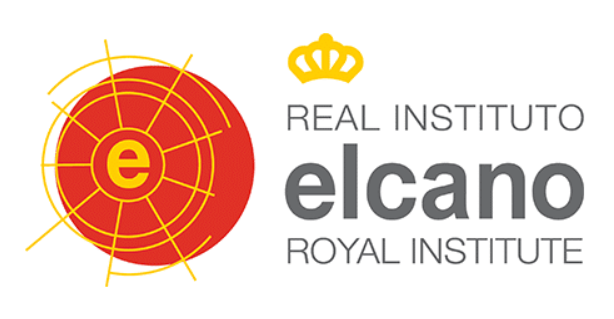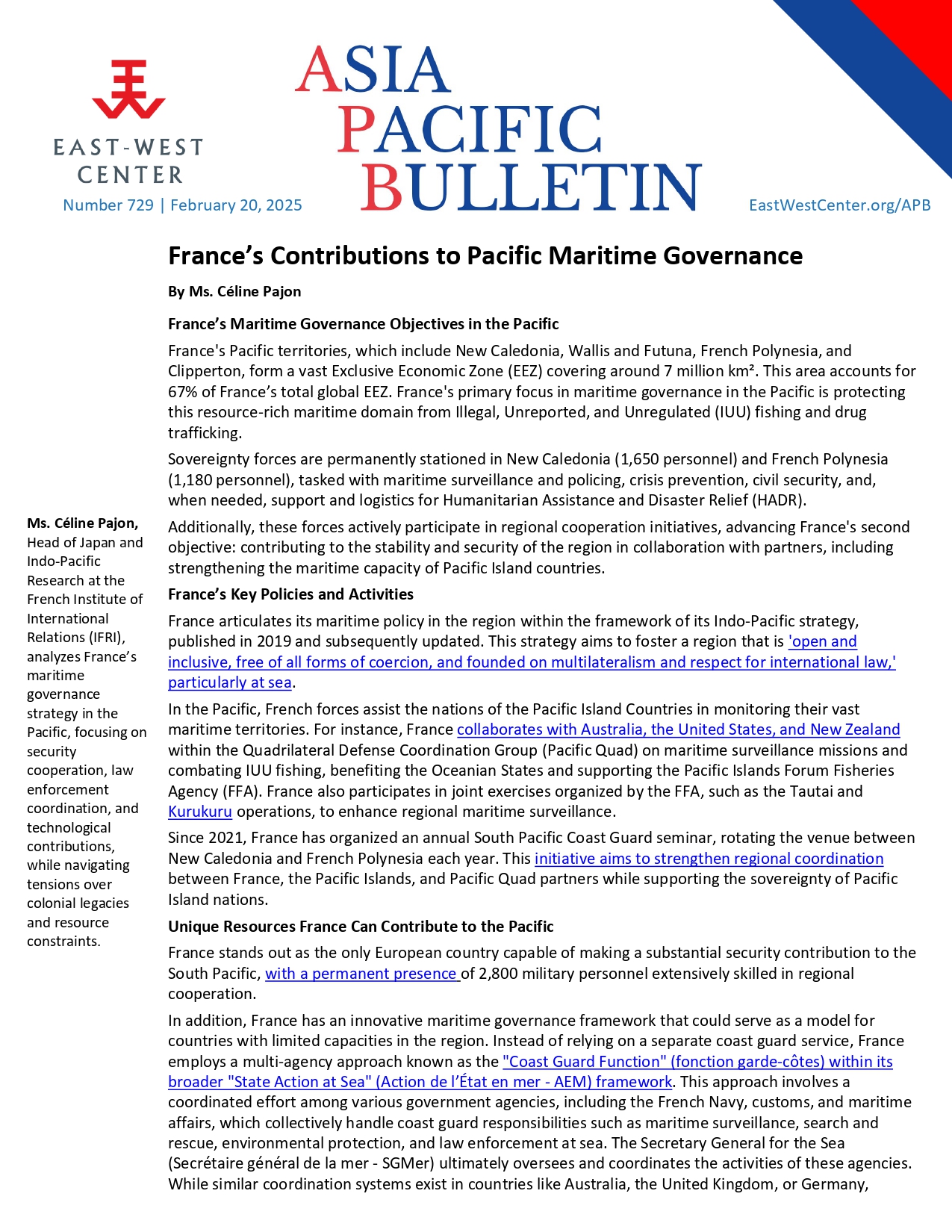France and Japan: The Indo-Pacific as a Springboard for a Strategic Partnership

For decades, the Franco-Japanese partnership has essentially been characterised by a vibrant cultural exchange as well as by sound economic relations. Today Japan is France’s second-largest trading partner in Asia (after China) and its leading Asian investor.
Without major points of friction between the two countries, the partnership was elevated in 2013 to an ‘exceptional’ level and a joint roadmap was adopted to expand cooperation to a strategic level, in particular through an annual Foreign and Defence Ministers’ Meeting (2+2 summit), a premium for France.
Indeed, despite being geographically distant, France and Japan share a number of converging interests, beginning with their attachment to liberal principles and the rule of law and further ranging from common concerns on unilateral challenges to the international order, to nuclear proliferation, international terrorism, piracy and so on. As a permanent member of the UN Security Council, a nuclear power, a close US ally and a resident power in the Indo-Pacific area, France stands out as a partner of choice for a Japan that is keen to normalise its defence posture and enhance its ‘international contribution to peace’ under the mandate of Prime Minister Shinzo Abe. The expansion of Franco-Japanese security cooperation thus benefits from two mutually reinforcing trends: Japan’s will to diversify its strategic partnerships to help uphold the international liberal order and balance China; and France’s renewed interest in upgrading its international leadership and expanding its security commitment in Asia, an area where it wants to be acknowledged as a responsible stakeholder. A certain convergence between the two countries’ strategy for the Indo-Pacific is thus providing a new motivation to develop bilateral security cooperation.
Franco-Japanese security cooperation gains substance
Bilateral security cooperation has expanded and gradually been institutionalised. Beyond the annual 2+2 meeting, an agreement on the transfer of defence equipment and technology, in force since December 2016, has paved the way to joint research and development of a new generation of underwater minesweeping technologies. In July 2018 an acquisition and cross-servicing agreement (ACSA) was signed to allow the sharing of defence supplies and services, an important step in expanding cooperation in peacekeeping and Humanitarian Assistance/Disaster Relief (HA/DR) operations and facilitating more ambitious joint exercises. So far, the bulk of bilateral cooperation has focused on maritime security, mostly in Asia, where Japan is taking part in HA/DR joint training managed by France in the South Pacific, but also in the Gulf of Aden, participating in multinational anti-piracy operations. In recent years, joint exercises have been upgraded and expanded with quadrilateral training in amphibious operations in Spring 2017 between Japanese, French, US and British ships as part of France’s Jeanne d’Arc mission near Guam. In February 2018 an exercise of control at sea was also conducted for the first time with the Frigate Vendemiaire, based in New Caledonia, and in Spring 2018 two Japanese P-1 aircraft engaged in maritime patrol training in France. Beyond the multiplication of port calls and joint exercises, France and Japan are seeking to expand their coordination in maritime capacity-building assistance activities in South-East Asia, the South Pacific and Africa, with the aim of contributing to maritime security and stability. With its blue-water navy, its overseas territories and pre-positioned military forces in the Indian Ocean and the Pacific, France has a unique position amongst European countries to contribute to the security and better governance of the commons in this strategic region. Other areas of cooperation include Africa, where the two countries have had neighbouring bases in Djibouti since 2011. A 2015 Joint Plan for Africa provided the groundwork for some modest cooperation efforts such as the joint funding of peacekeeping schools on the continent, the exchange of information and the protection of nationals. Cooperation with France to better understand the complex security environment in Africa, especially in the context of increasing terrorist attacks (10 Japanese citizens died in the In Amenas attacks in January 2013), has been a key element as Tokyo wants to expand its economic presence there. In 2016 Japanese defence attachés were trained in France and in exchange Paris would like to see Japan contributing funds to some security-related activities in the Sahel and West Africa. France also expects Japanese backing to enter multilateral security cooperation forums in East Asia, such as the ASEAN Defence Ministers’ Meeting Plus (ADMM+). The latest joint statements show that there is an ambition to enter a long-term security relationship by expanding cooperation in fields such as space (a Japanese X-band defence communication satellite was launched from French Guiana in March 2018), space-based maritime surveillance and cyberspace.
French freedom-of-navigation patrols
In recent years France has been stepping up its security commitment in Asia, in a move that meets Japan’s expectations. The 2017 Strategic Review of Defence and National Security thus clearly acknowledges the importance of the stability of the Indo-Pacific region for French national interests. A ‘nation of the Indo-Pacific region’, with 1.5 million nationals and a large exclusive economic zone, France maintains a military presence of more than 6,300 personnel from Djibouti to Reunion, New Caledonia and French Polynesia. French trade also relies heavily on the maritime routes of the Indian and Pacific Oceans. In addition, two major defence equipment contracts signed in 2016 with India (for 36 Rafale fighters) and Australia (for 12 submarines) point to a long-term security commitment in the region. In particular, France is keen to actively demonstrate its commitment to the freedom of navigation and rule-based order in Asia and is now taking the lead in Europe in this respect. In 2016 the Statement of the then Minister of Defence Jean-Yves Le Drian at the Shangri-La Dialogue emphasised the need to discourage unilateral coups de force in China seas for fear they might spread to other strategic areas like the Mediterranean and called for coordination between Europe’s navies to ensure a regular and visible presence in Asian waters.

Available in:
Regions and themes
Share
Related centers and programs
Discover our other research centers and programsFind out more
Discover all our analysesJammu and Kashmir in the Aftermath of August 2019
The abrogation of Article 370, which granted special status to the state of Jammu and Kashmir (J&K), has been on the agenda of the Bharatiya Janata Party (BJP) for many decades.

France’s Contributions to Pacific Maritime Governance
France stands out as the only European country capable of making a substantial security contribution to the South Pacific, with a permanent presence of 2,800 military personnel extensively skilled in regional cooperation.
Unlocking India’s Energy Transition: Addressing Grid Flexibility Challenges and Solutions
India is rapidly scaling up its renewable energy (RE) capacity, adding 15–20 GW annually, but the ambitious goal of 500 GW of non-fossil capacity by 2030 is at risk unless the pace accelerates.

The China-Russia Partnership and the Ukraine War: Aligned but not allied
China and Russia maintain a strategic partnership rooted in shared opposition to the U.S. and liberal democracies, but their relationship is shaped more by pragmatism than trust.










